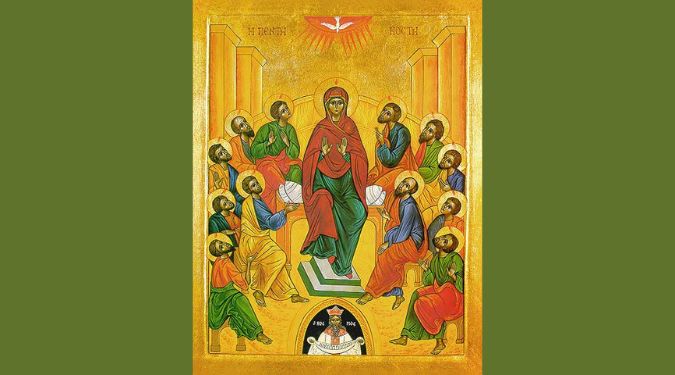The first precept of the Church is:
“You shall attend Mass on Sundays and holy days of obligation and rest from servile labor” Catechism of the Catholic Church, 2042
Sabbath rest applied to Sunday
In enjoining this precept, the Church obviously borrows the Sabbath rest from the Decalogue and applies it to the Lord’s Day, Sunday.
“Remember the sabbath day, to keep it holy. Six days you shall labor, and do all your work; but the seventh day is a sabbath to the Lord your God; in it you shall not do any work, you, or your son, or your daughter, your manservant, or your maidservant, or your cattle, or the sojourner who is within your gates; for in six days the Lord made heaven and earth, the sea, and all that is in them, and rested the seventh day; therefore the Lord blessed the sabbath day and hallowed it. Exodus 20:811
And:
Six days shall work be done; but on the seventh day is a sabbath of solemn rest, a holy convocation; you shall do no work; it is a sabbath to the Lord in all your dwellings. Leviticus 23:3
What is “servile work”?
In Latin, the phrase we translate as “servile work” is “operabus servilibus”, “slavish works” or “opere servili”, “slavish work”.
The early Church did not always highlight servile work when commanding rest on the Lord’s Day. For example, the Council of Laodicea (A.D. 360) mentions resting on the Lord’s Day:
Christians must not judaize by resting on the Sabbath, but must work on that day, rather honouring the Lord’s Day; and, if they can, resting then as Christians. But if any shall be found to be judaizers, let them be anathema from Christ. (Canon XXIX. [A.D. 360]). (“CHURCH FATHERS: Synod of Laodicea (4th Century)”)
Tertullian (A.D. 160-240) also mentions the practice of abstaining from work on the Lord’s Day:
We however, as we have received <the custom>, on the day of the Lord’s resurrection alone have the duty of abstaining not only from that (kneeling) but from every attitude and practice of solicitude, even putting off business so as to give no place to the devil. (Evans)
Canon 31 of the Third Council of Orléans (Gaul, AD 538) also enjoins the abstention from work on the Lord’s Day for the purpose of allowing proper worship:
This canon concerns the proper observation of the Lord’s day, i.e. Sunday. Although some argue that on this day Christians should not travel, prepare meals, or decorate houses, the synodal fathers consider all this to belonging to the Jewish tradition and do not prohibit any of these activities. Christians should avoid, however, manual labour in the countryside, thanks to which it will be easier for them to go to church. (Szafranowski)
The Roman Catechism does also:
Thou shalt do no work on it, says the Lord, thou, nor thy son, nor thy daughter, nor thy man servant, nor thy maidservant, nor thy beast, nor the stranger that is within thy gates. These words teach us, in the first place, to avoid whatever may interfere with the worship of God. Hence it is not difficult to perceive that all servile works are forbidden, not because they are improper or evil in themselves, but because they withdraw the attention from the worship of God, which is the great end of the Commandment. The Roman Catechism
Yes, but what is it?
Bishop Athanasius Schneider defines servile work as work “in which the body has a larger share than the mind, and which are chiefly intended for the advantage of the body” and provides these examples: “field labor, mechanical and industrial operations, manual trades, judiciary works, commercial works, and excessive or burdensome academic or mental work.” (Schneider 412)
Fr. Dominic Prümmer provides an explanation that also emphasizes the role of the body, but specifies that it is work “formerly done by slaves”:
Servile work is that which a) requires mainly bodily activity, b) has as its immediate purpose the welfare of the body, c) was formerly done by slaves; e.g. farm work such as digging or ploughing, mechanical work like sewing or making shoes…The character of servile work is not determined by the worker’s intention or by the fatigue involved, or by the fact that wages are received, etc., but solely by the nature of the work itself which remains servile even if done out of charity or for the sake of recreation. (Prümmer 196)
Prümmer also says that ”the character of servile work is not determined by the worker’s intention”, a principle that indicates that the nature of servile work, or rather, the abstention of it, is a sign, which we will discuss below.
Fr. Thomas L. Kinkead said that “Servile works are those which require labor rather of body than of mind” and he defines “servile” as “work which was formerly done by slaves” and thus excludes writing, reading, and studying from servile works because “they were not the work of slaves”. (Kinkead 317)
In his Summa Theologiae, St. Thomas Aquinas, a 13th century Doctor of the Church, defined servile work when addressing the keeping of the Lord’s Day:
Now servile work is so called from servitude: and servitude is threefold…Another servitude is whereby one man serves another. Now one man serves another not with his mind but with his body, as stated above (Q[104], AA[5],6, ad 1). Wherefore in this respect those works are called servile whereby one man serves another… corporal works, not pertaining to the spiritual worship of God, are said to be servile in so far as they belong properly to servants; while they are not said to be servile, in so far as they are common to those who serve and those who are free. Summa Theologiae, Second Part of the Second Part, Question 122, Article 4, Reply to Objection 3
By the way, St. Thomas also addressed exceptions to the precept to abstain from servile work:
…he may occupy himself with works connected with God’s service… it is not contrary to the observance of the Sabbath to exercise any spiritual act, such as teaching by word or writing… to provide necessaries both for himself and for his neighbor, chiefly in respect of things pertaining to the well-being of the body,..a corporal work pertaining to the preservation of one’s own bodily well-being does not profane the Sabbath…a bodily work that is directed to the bodily well-being of another is not contrary to the observance of the Sabbath…Summa Theologiae, Second Part of the Second Part, Question 122, Article 4, Reply to Objection 3
Canon Law
The current Code of Canon Law (1983) does not specifically mention the servile nature of the work to be avoided on Sundays:
Canon 1247. On Sundays and other holydays of obligation, the faithful are obliged to assist at Mass. They are also to abstain from such work or business that would inhibit the worship to be given to God, the joy proper to the Lord’s Day, or the due relaxation of mind and body. CIC 1247
The 1917 or Pio-Benedictine Code of Canon Law does, however:
Canon 1248. On feast days of precept, Mass is to be heard; there is an abstinence from servile work, legal acts, and likewise, unless there is a special indult or legitimate customs provide otherwise, from public trade, shopping, and other public buying and selling.
The New Exodus
We must turn to the Exodus to fully understand why, of all of the precepts of the Mosaic Law, the Church maintained the sabbath rest and specifically proscribed servile work:
Scripture also reveals in the Lord’s day a memorial of Israel’s liberation from bondage in Egypt: “You shall remember that you were a servant in the land of Egypt, and the LORD your God brought you out thence with mighty hand and outstretched arm; therefore the LORD your God commanded you to keep the sabbath day. Catechism of the Catholic Church 2170
Books 30 and 36 of the Apostolic Constitutions (ca. A.D. 375) associates resting on the Lord’s Day with deliverance from bondage:
On the day of the resurrection of the Lord, that is, the Lord’s day, assemble yourselves together, without fail, giving thanks to God, and praising Him for those mercies God has bestowed upon you through Christ, and has delivered you from ignorance, error, and bondage, that your sacrifice may be unspotted…O Lord Almighty You have created the world by Christ, and hast appointed the Sabbath in memory thereof, because that on that day You have made us rest from our works, for the meditation upon Your laws. (Roberts et al.)
St. John Chrysostom (c. 347 – 407), an archbishop of Constantinople and Doctor of the Church, reminded the faithful that the Sunday rest was established in part as a reminder that [spiritually] we were servants “in the land of Egypt”.
Wherefore when He speaks to us of another commandment, not known to us by the dictate of consciences He not only prohibits, but adds the reason. When, for instance, He gave commandment respecting the Sabbath; On the seventh day you shall do no work; He subjoined also the reason for this cessation. What was this? Because on the seventh day God rested from all His works which He had begun to make. And again; Because thou were a servant in the land of Egypt. St. John Chrysostom, Homily 12 on the Statues, 9
The saint is quoting of course, from the Book of Deuteronomy:
“You shall remember that you were a servant in the land of Egypt, and the Lord your God brought you out thence with a mighty hand and an outstretched arm; therefore the Lord your God commanded you to keep the sabbath day. Deuteronomy 5:15
In his Apostolic Letter, Dies Domini, on Keeping the Lord’s Day Holy, St. Pope John Paul II ties the practice of Sunday rest tightly to the liberation wrought for us by Our Lord:
…the Sabbath observance is closely linked with the liberation which God accomplished for his people…Christ came to accomplish a new “exodus”, to restore freedom to the oppressed…He…restores to the Sabbath observance its liberating character, carefully safeguarding the rights of God and the rights of man. This is why Christians, called as they are to proclaim the liberation won by the blood of Christ, felt that they had the authority to transfer the meaning of the Sabbath to the day of the Resurrection. The Passover of Christ has in fact liberated man from a slavery more radical than any weighing upon an oppressed people — the slavery of sin, which alienates man from God, and alienates man from himself and from others, constantly sowing within history the seeds of evil and violence. Dies Domini 62-63
Conclusion
The Church has not always specifically proscribed servile work when commanding rest on the Lord’s Day, but we can, from a close reading of certain Church Fathers and recent magisterial teaching, recover the significance of abstaining from specifically servile and slavish work as a sign that reminds us of the radical liberation from the slavery of sin.
Works Cited
“CHURCH FATHERS: Synod of Laodicea (4th Century).” New Advent, https://www.newadvent.org/fathers/3806.htm. Accessed 5 March 2025.
Evans, Ernest, translator. De Oratione. Tertullian’s tract on The Prayer, https://www.tertullian.org/articles/evans_orat/evans_orat_04english.htm. Accessed 4 March 2025.
Kinkead, Thomas L. An explanation of the Baltimore catechism of Christian doctrine : for the use of Sunday-school teachers and advanced classes. New York, Benziger, 1921, https://archive.org/details/explanationofbal00kink_0/page/316/mode/2up. Accessed 4 March 2025.
Prümmer, O.P, Dominic M. Handbook of Moral Theology. The Mercier Press, Limited, 1956.
Roberts, Alexander, et al., editors. Ante-Nicene Fathers, Vol. 7. Translated by James Donaldson. 1886, Buffalo, New York. New Advent, http://www.newadvent.org/fathers/07157.htm. Accessed 4 March 2025.
Schaff, Philip, editor. Nicene and Post-Nicene Fathers, First Series. Translated by W.R.W. Stephens, vol. 9, Buffalo, Christian Literature Publishing Co., 1889. New Advent, http://www.newadvent.org/fathers/190112.htm. Accessed 4 March 2025.
Schneider, Athanasius. Credo: Compendium of the Catholic Faith. Sophia Institute Press, 2023.
St. Pope John Paul II. Dies Domini. Apostolic Letter. 31 May 1998. The Holy See, http://www.vatican.va/content/john-paul-ii/en/apost_letters/1998/documents/hf_jp-ii_apl_05071998_dies-domini.html. Accessed 5 March 2025.
Szafranowski, J., translator. Canon 31 of the Third Council of Orléans (Gaul, AD 538) decrees that those who work on Sunday should be punished by the priest and not the lay authority. The Presbyters of the Late Antique West, University of Warsaw, https://www.presbytersproject.ihuw.pl/index.php?id=6&SourceID=1328. Accessed 4 March 2025.



